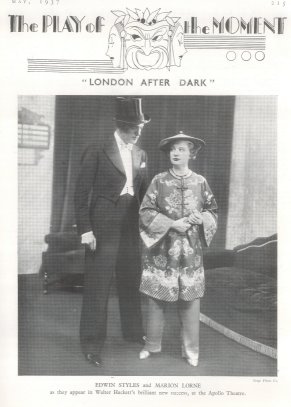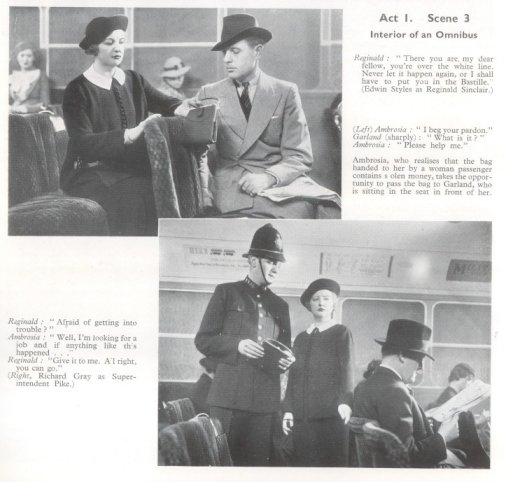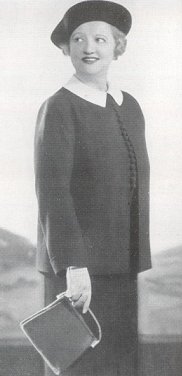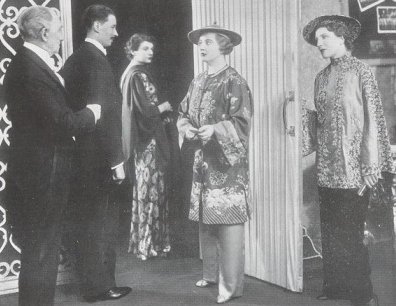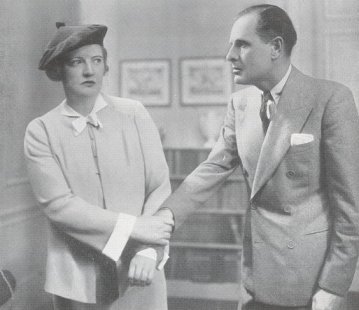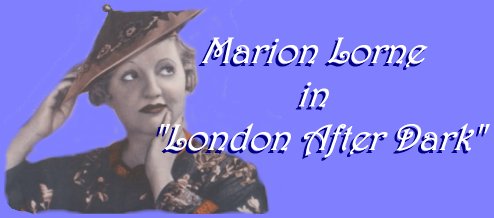
| By
CosmosCotillion
Theatre World Magazine, United Kingdom "London After Dark" at The Apollo Theatre London, England
Edwin Styles and Marion Lorne in "London After Dark" Another starry and joyous event was the Apollo first night of "London After Dark" which brought Marion Lorne back to us. Behind the scenes afterwards the actress "twittered" happily to crowds of friends who all admired the "show exhibit" in her flower-lined dressing room---an offering from her playwright-husband Walter Hackett of red roses and lilies of the valley, complete with lucky white heather and gilded horseshoe. Walter Hackett is a past master in the art of providing a combination of mystery, thrills and laughter so expertly that there is never any danger of one element encroaching on another. How often one has seen a comedy-thriller where a badly placed laugh has killed quite a promising and exciting situation stone dead? In a Hackett play everything is in its own watertight compartment. When he wants you to laugh, you will laugh. If he wants you to become tense and excited, then tense and excited you will become. It is all, I have no doubt, the result of years of concentrated study of what an audience appreciates and what it dislikes. Mr. Hackett has made the theatre his life's work and sole interest. He has refused to be side-tracked into the film industry, and he now has his reward in one of the most constant and loyal followings in the West End theatre. "London After Dark", the latest of an amazingly long and successful series, is, in my view, the best play Walter Hackett has given us since "Ambrose Applejohn's Adventure".
Lorne in Act 1 of the Play He shows us a cross-section of London's teeming night life, and by the ingenious use of coincidence contrives to link-up the lives of people hitherto unknown and unrelated to each other. The action is continuous, and beginning with the gruesome discovery of a murder in a Mayfair mews, there is never a dull moment until the guilty person is safely handcuffed. In the meantime Marion Lorne has been having the time of her life and, it follows naturally, of ours---as a fluttering young woman who through no fault of her own comes under police supervision and surveillance, but is ultimately able to draw their attention to the guilty party.
Lorne as Ambrosia Seabrook Ambrosia Seabrook is jolting in an omnibus on her way to the Grand Cinema, Piccadilly Circus, where she has just obtained a job as usherette. There, arrayed in a gorgeous Chinese uniform, she will usher in the guests at a charity gala premiere of an Oriental film, blissfully unconscious that the next mammoth presentation is to be "The Garden of Eden"!
A Gala Scene from the Play with Lorne as an Usherette But before she arrives at Piccadilly, she has lost her purse, had a stolen handbag "planted" on her by a woman passenger, and solicited the help of a young man sitting in the seat in front of her. Since this man happens to be the perpetrator of the crime the newsboys are now shouting on the streets, it follows that Ambrosia has bitten off far more than she can chew. The murderer entrusts her with a message and then repenting of his rashness, decides that she must be followed and, if necessary, silenced forever. Ambrosia, immersed in her newly found activities as usherette, manipulating a torch as to the manner born and inevitably tripping over the very step against which she warns the patrons, finds herself involved in a cross-examination by emissaries from the Yard. It would be unfair to reveal what follows after.
Lorne in a Dramatic Scene from the Play As Ambrosia, Marion Lorne has a part that fits her like the proverbial glove. She has never been more inimitably droll or irresistibly funny. The audience roared its delightful approval of everything she said and did. Edwin Styles as the debonair graduate of Hendon Police College is also in excellent form, providing the perfect foil and contrast to Miss Lorne's timid ebullience. Robert Andrews, escaping at last from years of drawing-room fatuity, gives a splendid portrayal of a man haunted by a guilty conscience. Richard Gray makes a stolid and convincing Superintendent, Cathleen Nesbitt skillfully conveys the emotional stress of Mrs. Morant, and a long supporting cast lend every assistance to the leading players. |
